COG 363: Analyzing False Memory in Eyewitness Testimony Accuracy
VerifiedAdded on 2023/06/13
|11
|664
|207
Essay
AI Summary
This essay discusses the phenomenon of false memory, defined as distorted or fabricated recollections of events, and its significant impact on eyewitness testimony. It highlights how false memories can affect the reliability of eyewitness accounts in criminal proceedings, influencing perceptions, recall, and reporting of events. The essay emphasizes the need for caution when considering eyewitness testimonies due to the potential for memory distortion, referencing research on the susceptibility of eyewitness memory to suggestion and the development of false memories, and concludes by pointing out that eyewitness memories may comprise of schematically dependable particulars which are not knowledgeable perceptually. Desklib offers a wide array of study tools and solved assignments for students.
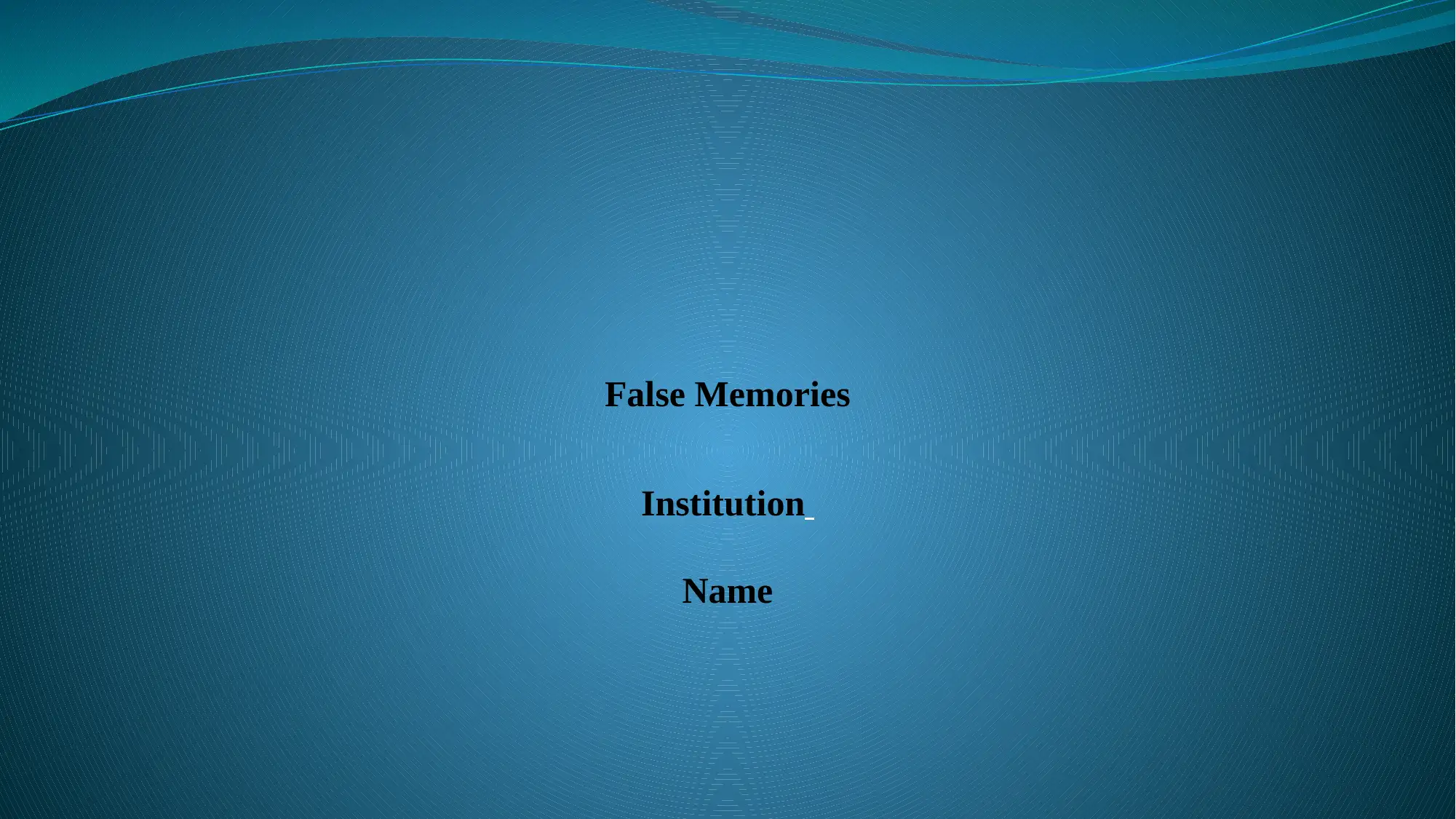
False Memories
Institution
Name
Institution
Name
Paraphrase This Document
Need a fresh take? Get an instant paraphrase of this document with our AI Paraphraser
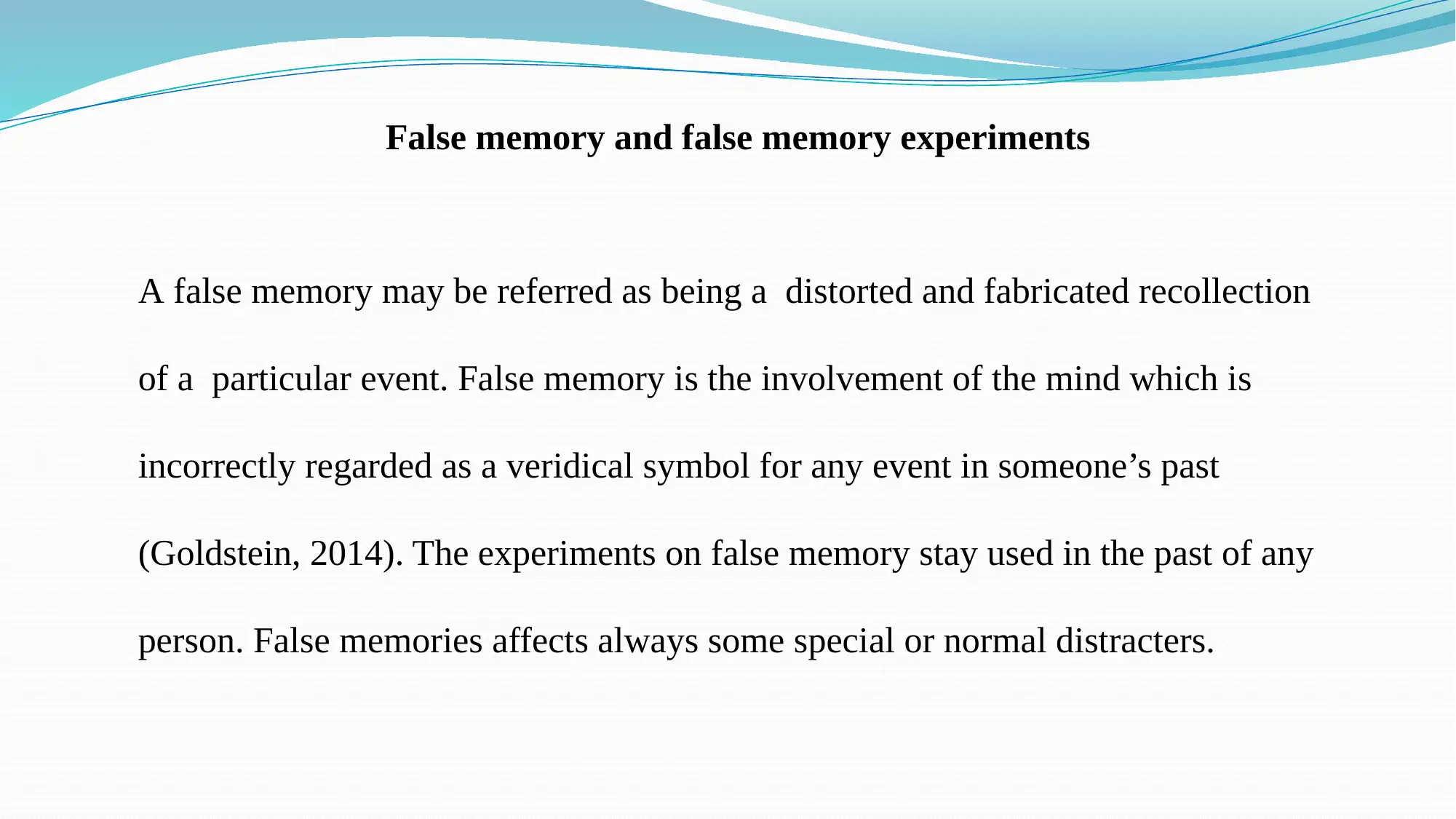
False memory and false memory experiments
A false memory may be referred as being a distorted and fabricated recollection
of a particular event. False memory is the involvement of the mind which is
incorrectly regarded as a veridical symbol for any event in someone’s past
(Goldstein, 2014). The experiments on false memory stay used in the past of any
person. False memories affects always some special or normal distracters.
A false memory may be referred as being a distorted and fabricated recollection
of a particular event. False memory is the involvement of the mind which is
incorrectly regarded as a veridical symbol for any event in someone’s past
(Goldstein, 2014). The experiments on false memory stay used in the past of any
person. False memories affects always some special or normal distracters.
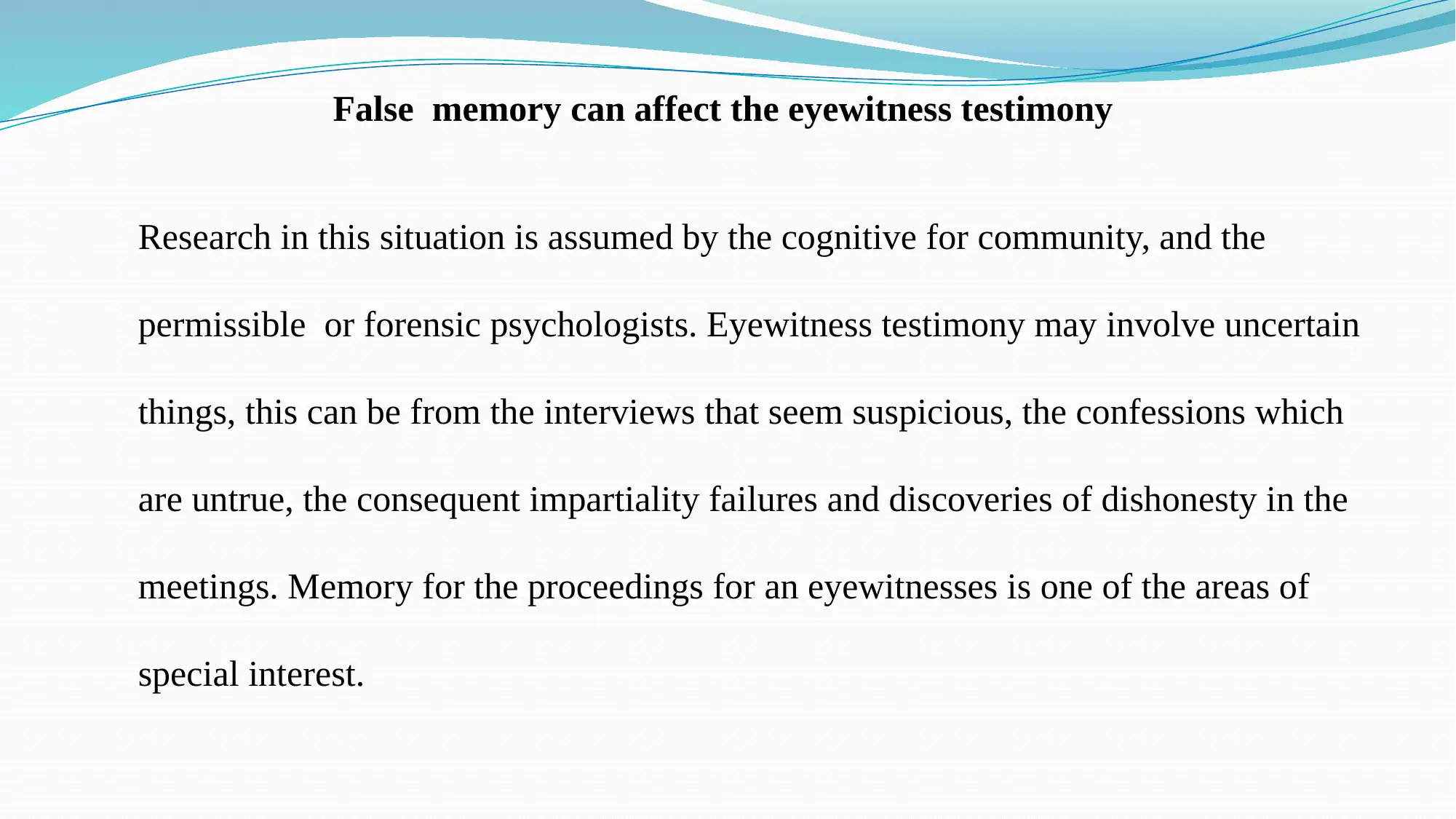
False memory can affect the eyewitness testimony
Research in this situation is assumed by the cognitive for community, and the
permissible or forensic psychologists. Eyewitness testimony may involve uncertain
things, this can be from the interviews that seem suspicious, the confessions which
are untrue, the consequent impartiality failures and discoveries of dishonesty in the
meetings. Memory for the proceedings for an eyewitnesses is one of the areas of
special interest.
Research in this situation is assumed by the cognitive for community, and the
permissible or forensic psychologists. Eyewitness testimony may involve uncertain
things, this can be from the interviews that seem suspicious, the confessions which
are untrue, the consequent impartiality failures and discoveries of dishonesty in the
meetings. Memory for the proceedings for an eyewitnesses is one of the areas of
special interest.
⊘ This is a preview!⊘
Do you want full access?
Subscribe today to unlock all pages.

Trusted by 1+ million students worldwide
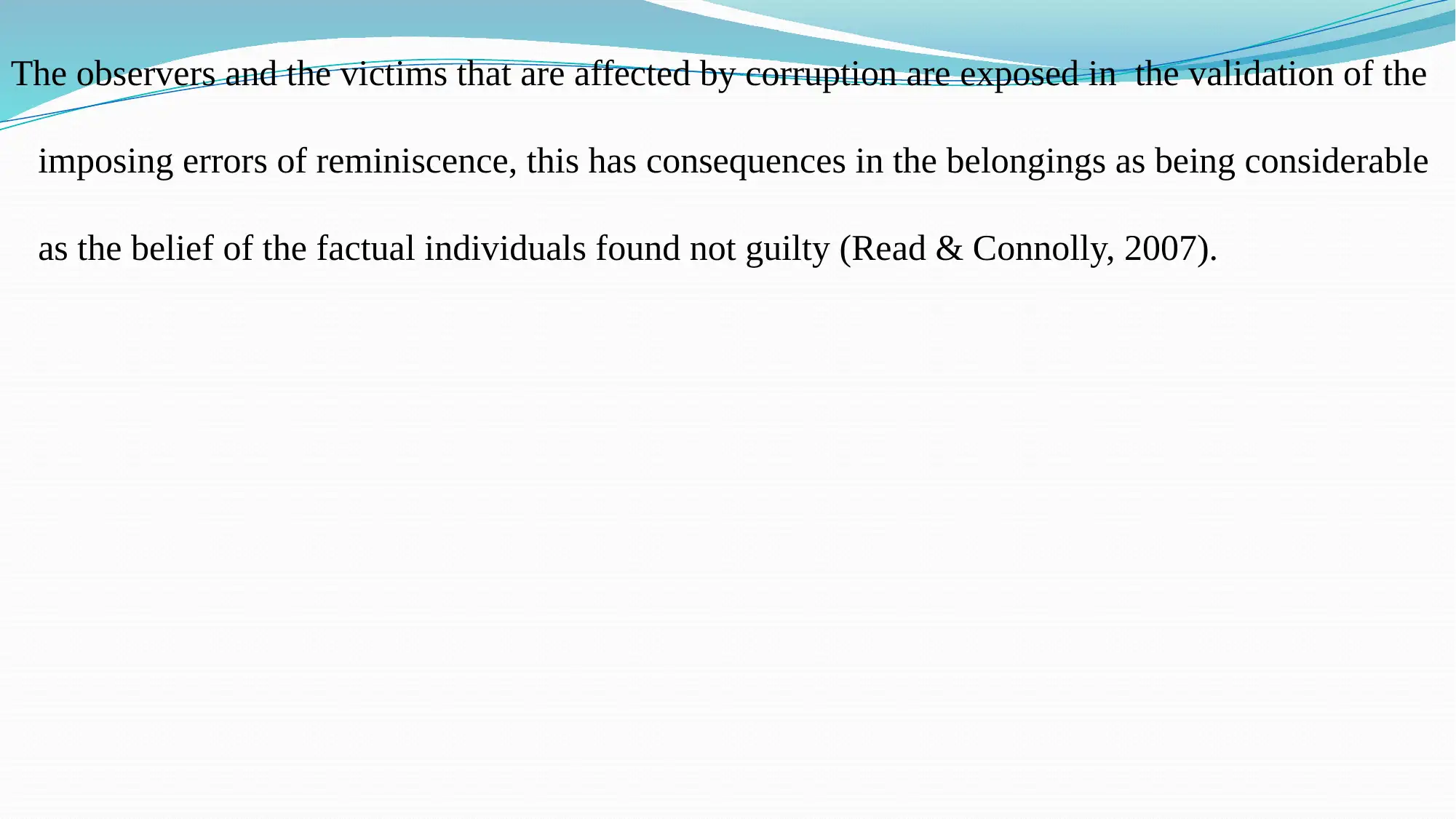
The observers and the victims that are affected by corruption are exposed in the validation of the
imposing errors of reminiscence, this has consequences in the belongings as being considerable
as the belief of the factual individuals found not guilty (Read & Connolly, 2007).
imposing errors of reminiscence, this has consequences in the belongings as being considerable
as the belief of the factual individuals found not guilty (Read & Connolly, 2007).
Paraphrase This Document
Need a fresh take? Get an instant paraphrase of this document with our AI Paraphraser
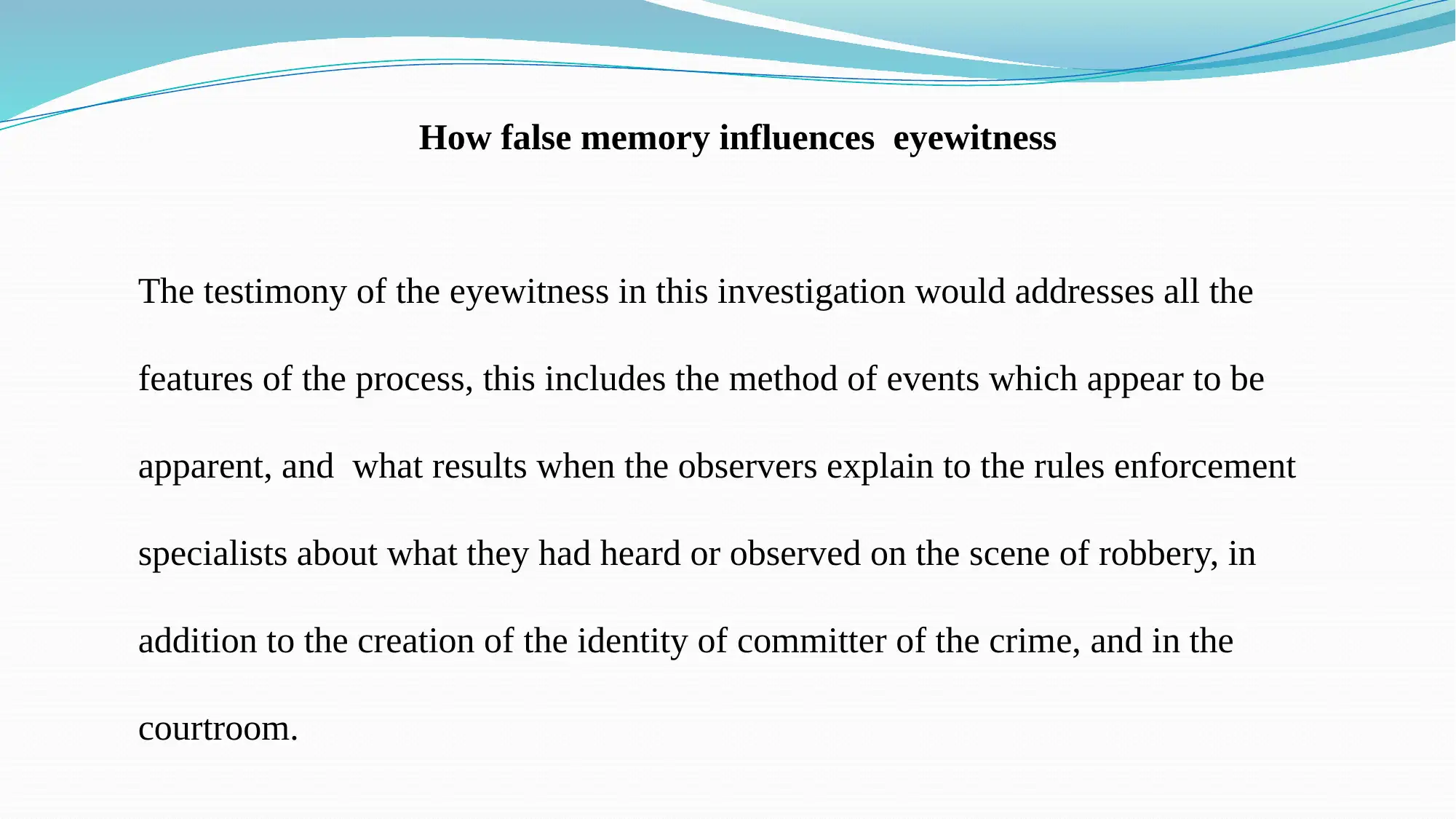
How false memory influences eyewitness
The testimony of the eyewitness in this investigation would addresses all the
features of the process, this includes the method of events which appear to be
apparent, and what results when the observers explain to the rules enforcement
specialists about what they had heard or observed on the scene of robbery, in
addition to the creation of the identity of committer of the crime, and in the
courtroom.
The testimony of the eyewitness in this investigation would addresses all the
features of the process, this includes the method of events which appear to be
apparent, and what results when the observers explain to the rules enforcement
specialists about what they had heard or observed on the scene of robbery, in
addition to the creation of the identity of committer of the crime, and in the
courtroom.
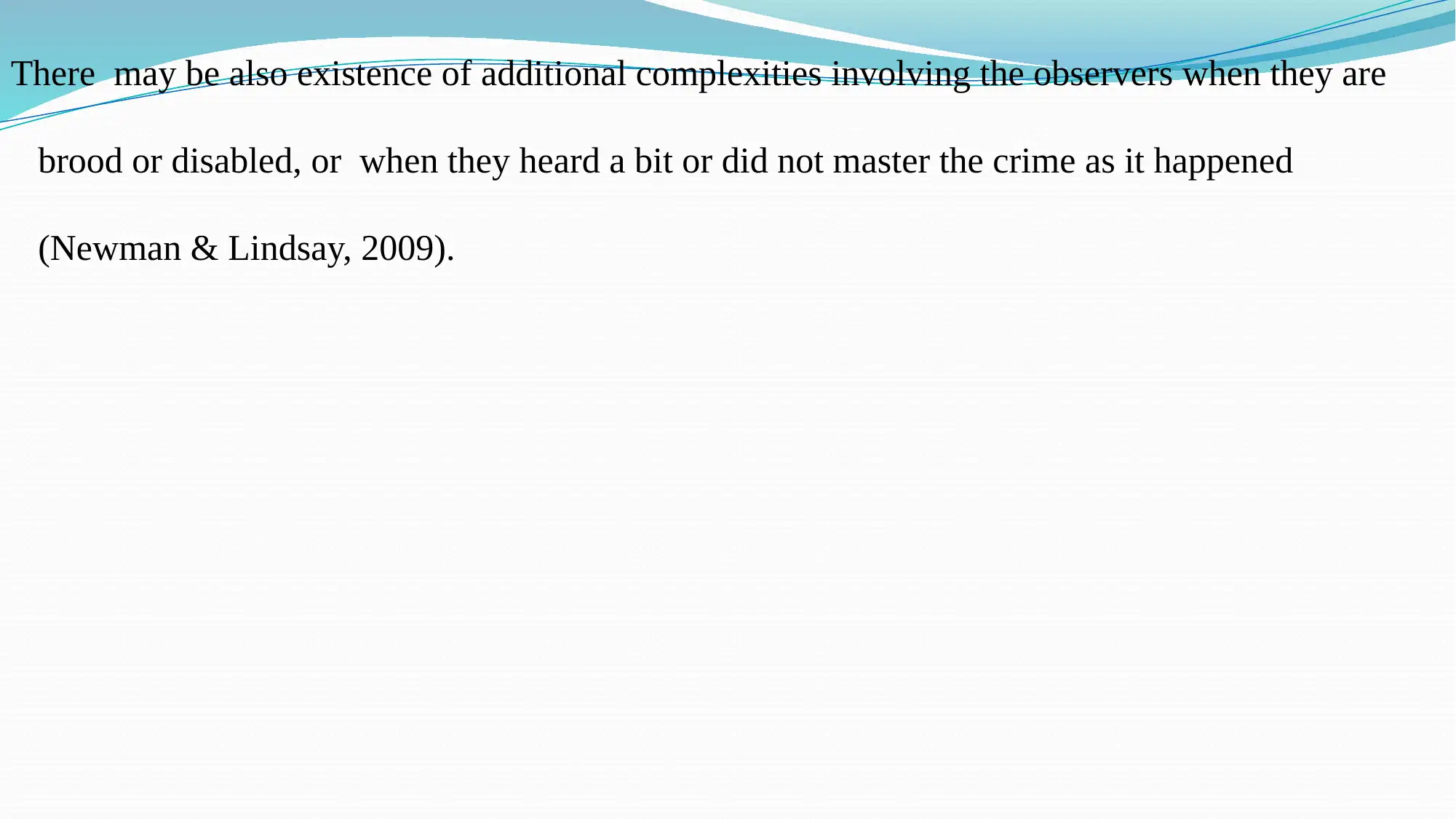
There may be also existence of additional complexities involving the observers when they are
brood or disabled, or when they heard a bit or did not master the crime as it happened
(Newman & Lindsay, 2009).
brood or disabled, or when they heard a bit or did not master the crime as it happened
(Newman & Lindsay, 2009).
⊘ This is a preview!⊘
Do you want full access?
Subscribe today to unlock all pages.

Trusted by 1+ million students worldwide
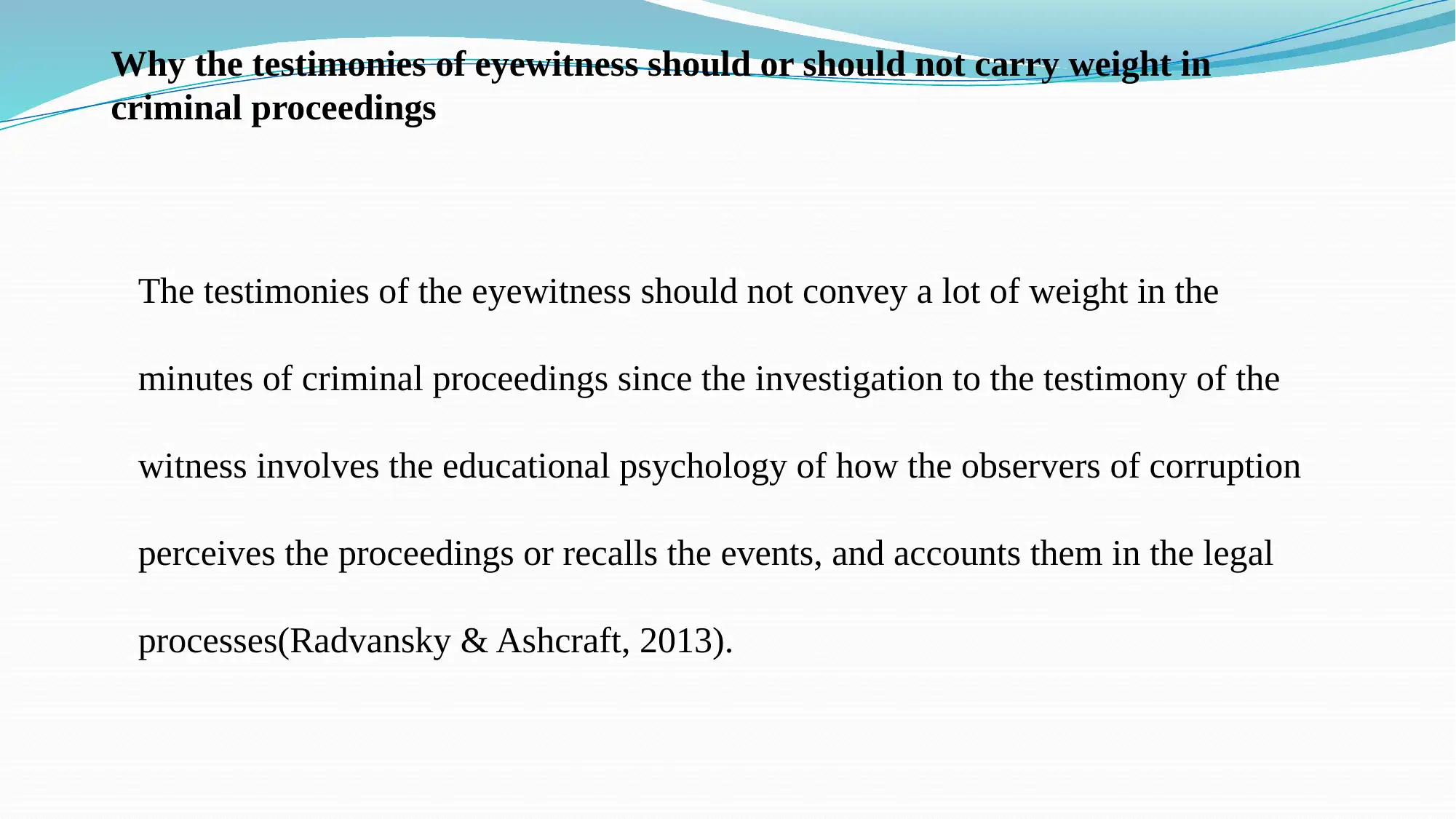
Why the testimonies of eyewitness should or should not carry weight in
criminal proceedings
The testimonies of the eyewitness should not convey a lot of weight in the
minutes of criminal proceedings since the investigation to the testimony of the
witness involves the educational psychology of how the observers of corruption
perceives the proceedings or recalls the events, and accounts them in the legal
processes(Radvansky & Ashcraft, 2013).
criminal proceedings
The testimonies of the eyewitness should not convey a lot of weight in the
minutes of criminal proceedings since the investigation to the testimony of the
witness involves the educational psychology of how the observers of corruption
perceives the proceedings or recalls the events, and accounts them in the legal
processes(Radvansky & Ashcraft, 2013).
Paraphrase This Document
Need a fresh take? Get an instant paraphrase of this document with our AI Paraphraser
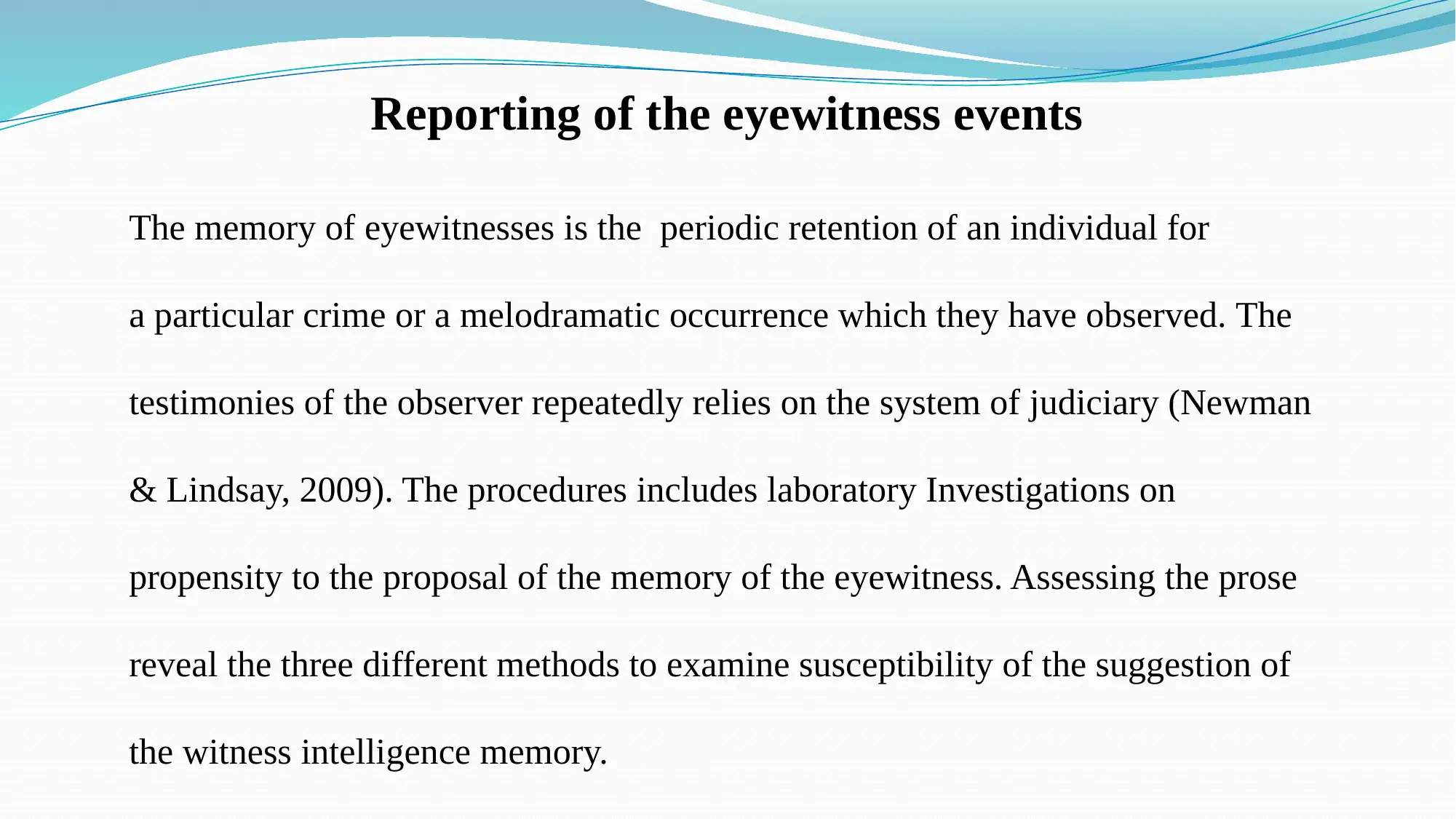
Reporting of the eyewitness events
The memory of eyewitnesses is the periodic retention of an individual for
a particular crime or a melodramatic occurrence which they have observed. The
testimonies of the observer repeatedly relies on the system of judiciary (Newman
& Lindsay, 2009). The procedures includes laboratory Investigations on
propensity to the proposal of the memory of the eyewitness. Assessing the prose
reveal the three different methods to examine susceptibility of the suggestion of
the witness intelligence memory.
The memory of eyewitnesses is the periodic retention of an individual for
a particular crime or a melodramatic occurrence which they have observed. The
testimonies of the observer repeatedly relies on the system of judiciary (Newman
& Lindsay, 2009). The procedures includes laboratory Investigations on
propensity to the proposal of the memory of the eyewitness. Assessing the prose
reveal the three different methods to examine susceptibility of the suggestion of
the witness intelligence memory.
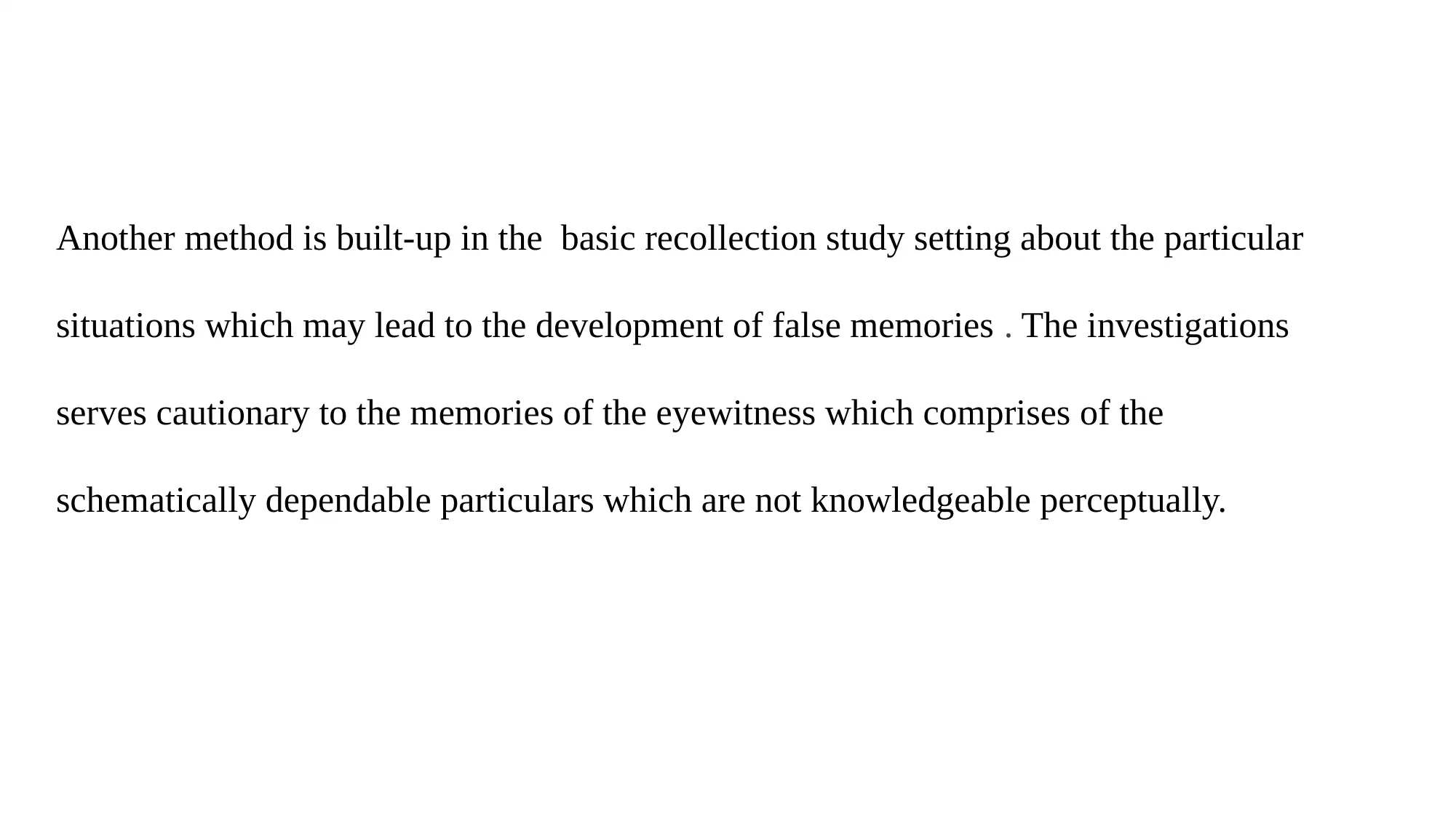
Another method is built-up in the basic recollection study setting about the particular
situations which may lead to the development of false memories . The investigations
serves cautionary to the memories of the eyewitness which comprises of the
schematically dependable particulars which are not knowledgeable perceptually.
situations which may lead to the development of false memories . The investigations
serves cautionary to the memories of the eyewitness which comprises of the
schematically dependable particulars which are not knowledgeable perceptually.
⊘ This is a preview!⊘
Do you want full access?
Subscribe today to unlock all pages.

Trusted by 1+ million students worldwide
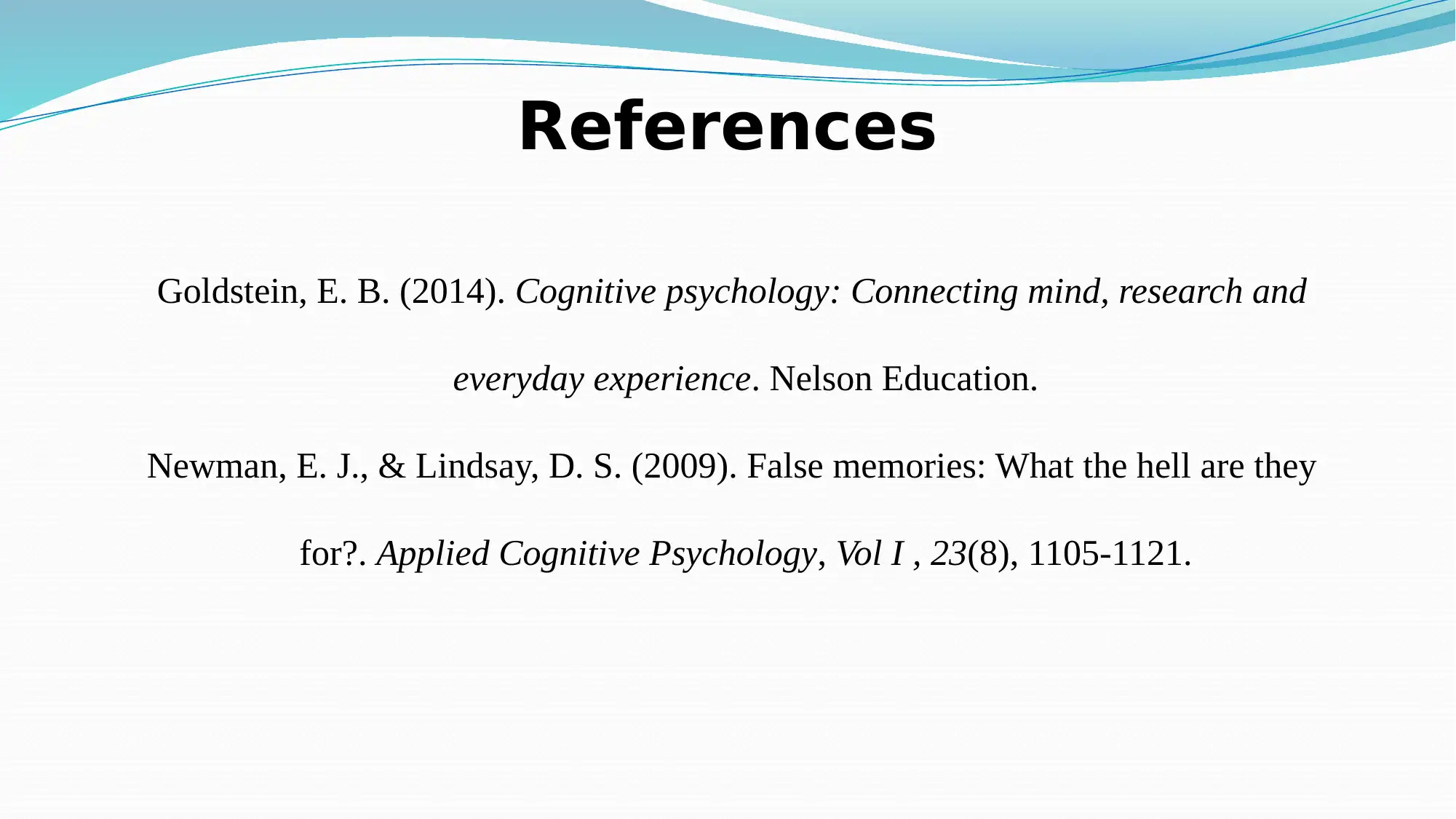
References
Goldstein, E. B. (2014). Cognitive psychology: Connecting mind, research and
everyday experience. Nelson Education.
Newman, E. J., & Lindsay, D. S. (2009). False memories: What the hell are they
for?. Applied Cognitive Psychology, Vol I , 23(8), 1105-1121.
Goldstein, E. B. (2014). Cognitive psychology: Connecting mind, research and
everyday experience. Nelson Education.
Newman, E. J., & Lindsay, D. S. (2009). False memories: What the hell are they
for?. Applied Cognitive Psychology, Vol I , 23(8), 1105-1121.
Paraphrase This Document
Need a fresh take? Get an instant paraphrase of this document with our AI Paraphraser
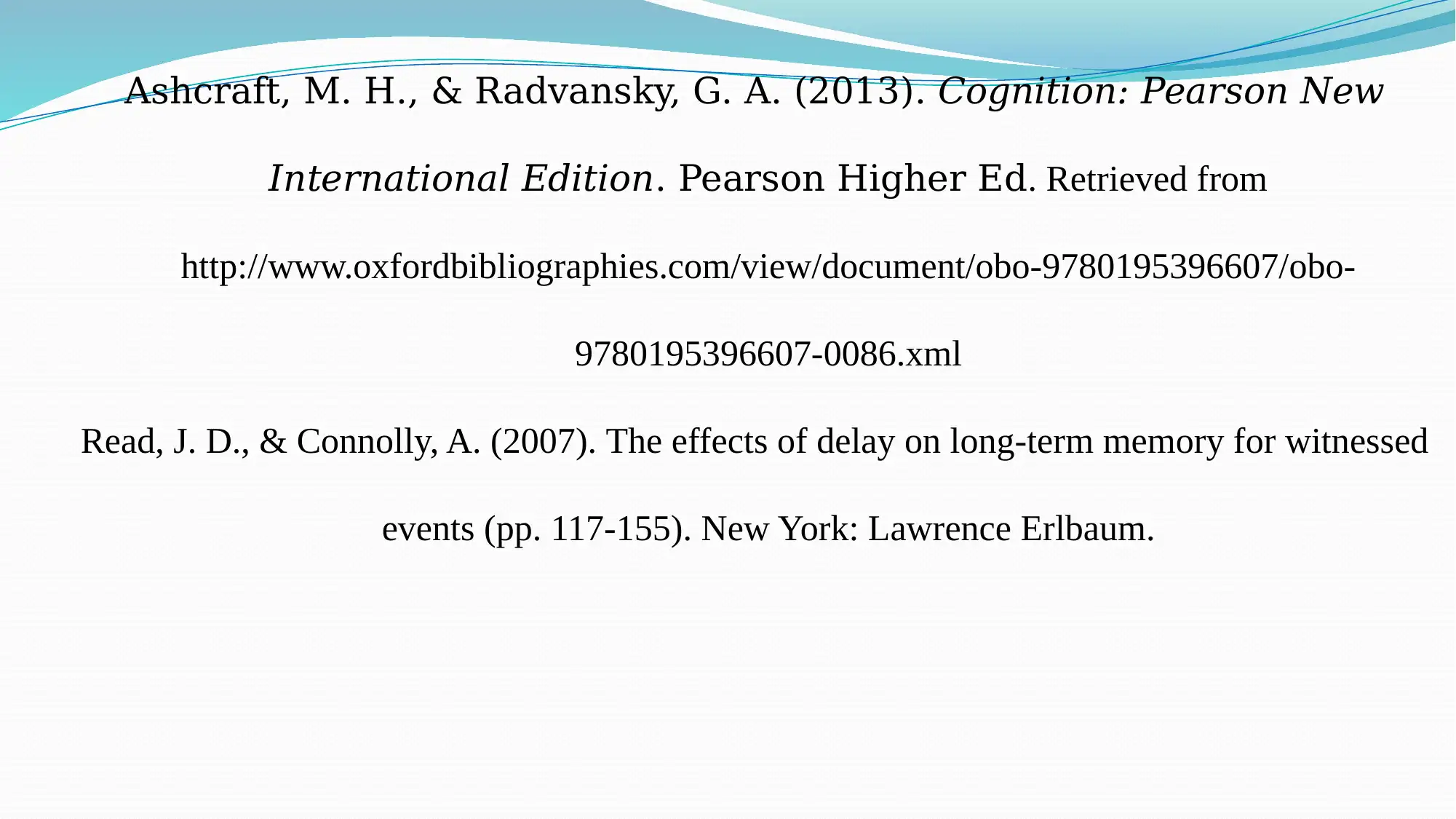
Ashcraft, M. H., & Radvansky, G. A. (2013). Cognition: Pearson New
International Edition. Pearson Higher Ed. Retrieved from
http://www.oxfordbibliographies.com/view/document/obo-9780195396607/obo-
9780195396607-0086.xml
Read, J. D., & Connolly, A. (2007). The effects of delay on long-term memory for witnessed
events (pp. 117-155). New York: Lawrence Erlbaum.
International Edition. Pearson Higher Ed. Retrieved from
http://www.oxfordbibliographies.com/view/document/obo-9780195396607/obo-
9780195396607-0086.xml
Read, J. D., & Connolly, A. (2007). The effects of delay on long-term memory for witnessed
events (pp. 117-155). New York: Lawrence Erlbaum.
1 out of 11
Related Documents
Your All-in-One AI-Powered Toolkit for Academic Success.
+13062052269
info@desklib.com
Available 24*7 on WhatsApp / Email
![[object Object]](/_next/static/media/star-bottom.7253800d.svg)
Unlock your academic potential
Copyright © 2020–2026 A2Z Services. All Rights Reserved. Developed and managed by ZUCOL.



